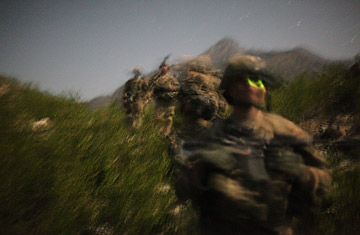
US Soldiers walk down the mountain toward landing zone be flown out by Blackhawks back to Combat Outpost Monti, in Kunar Province, Afghanistan, November 5, 2011.
(2 of 2)
The Veterans Affairs Department says that because protective and lifesaving technologies have advanced, soldiers who would have died from their wounds are living today — but they are living with TBI and PTSD. The VA defines TBI as the result of something striking the head with "significant force." This can happen, for example, after an improvised explosive device explodes under a vehicle. The VA says, "individuals who sustain a TBI may experience a variety of effects, such as an inability to concentrate, an alteration of the senses, difficulty speaking, and emotional and behavioral changes." The VA defines PTSD as an anxiety disorder occurring after living through a life-threatening or traumatic event. Symptoms include flashbacks, avoiding situations that remind the survivor of the event, feeling emotionally numb or feeling keyed up and jittery. All of these have led veterans to higher rates of drug and alcohol abuse, suicide and relationship and employment problems.
"The military has a long way to go in addressing the mental health needs of soldiers. Young people come into the military at an age when mental health problems are often first emerging, and then are thrust into situations that even the healthiest person would find traumatic and destabilizing," says Heather Barr, Human Rights Watch's researcher in Afghanistan, who spent seven years working with mentally impaired prisoners in the U.S.
Part of the failure comes from a simple lack of mental health professionals in theater. Captain David Weller, a social worker in Regional Command East, the war torn area that covers most of Afghanistan's violent border with Pakistan, was flown from his offices at Jalalabad Airbase to Combat Outpost Monti to counsel the Sgt. Sanes' platoon just days after the battle to take OP Shal. Weller tells TIME that, besides himself, there is one psychiatrist, one psychologist, a second social worker and four technicians to look after the mental health of around 33,000 troops at 21 forward operating bases and combat outposts in one of Afghanistan's most violent commands. "There are only a few of us for a big area." By mid-October 2011, Cpt. Weller had seen close to 200 people one-on-one and "a lot more off the cuff." He had been deployed for two months at that point. "I spend all my time counseling soldiers. But they need it."
When asked if the soldiers could be scarred for their whole lives, Weller said, "if they don't deal with it and they don't learn how to deal with the emotional side of everything and learn how to process that. That's why we have the stress team and we're forward deployed. We try to get out there as quickly as possible and talk to them about what they've seen. Cause it doesn't take a six day or ten day event. It could be one event. A rollover. An explosion. Seeing somebody dying. We don't know what will trigger it. Everybody's different." Says Weller, "a lot of [first platoon's soldiers] were very overwhelmed with what they've seen and what they've experienced. The adrenaline rush. What we experience on a normal basis lasts 30 seconds to a couple minutes here and there. And they went through days of it at a time."
Cpt. Weller says he sees, "issues related to insomnia and nightmares, a lot of guys that tend to avoid crowds. They feel like they've always got to check their surroundings. They feel like they need to check places where an IED might be, or they might check places where a sniper might be. And this could all be going on while they're sitting in a restaurant back home. Or sitting at a ballgame, if they go to a ballgame. You see a lot of avoidance. We see a lot of people turn to drugs and alcohol, just cause its so difficult to deal with. And, if it's bad enough, we see paranoia, and different things like that."
Back in October 2011, Fuentes said that his soldiers were "having a hard time sleeping. It was our sister element who took the casualty, [when a helicopter's rotor blade beheaded a medic who came in to collect the wounded Afghan sergeant and others], and it was our guys who stepped in and cleaned up all the... aftermath, and they're having some problems with that. Not being able to wind down. Winding down's the hardest thing." Staff Sgt. Everett Bracey said, "just being in such a high stress environment for nine days has definitely taken its toll on everybody in this platoon." Captain Michael Kolton, the company commander, said he had already evacuated around 25 soldiers diagnosed with TBI out of around 200 in the company by mid-October, just seven months into a yearlong deployment.
